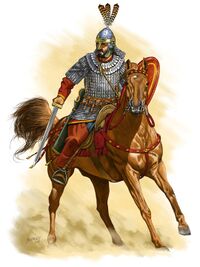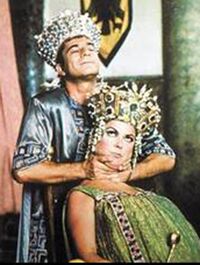Tiberius II
“I am the right man for the job of emperor. I have impressive thighs!”
Tiberius II Constantine (Τιβέριος Κωνσταντῖνος) was the big man of the Eastern Roman Empire from 574 to 582 (acquiring an official title at about the halfway point). His road to the imperial throne is an unusual one. He got the job via sucking up to his predecessor's wife, but then dumped her when he got to become emperor himself.
Tiberius wasn't mad, or bad. But he wasn't very good, either. Tiberius did apparently have a good physique, especially in the upper-leg area, yet this did little to improve his military or political luck. During his time in power, further territory was lost to the Lombards in Italy, and the Danube frontier saw a new horde of Barbarian horsemen pitch up from Asia, looking for booty to decorate their animal-hide tents.
Origins[edit]
Tiberius grew up in Thrace, in what is now Bulgaria. His first language was Latin (like Justinian I and emperors before him), followed by Greek and donkey sounds to imitate the speech of 'barbarians.' He was the last East Roman Emperor to be comfortable speaking Latin; it was already dying out everywhere except in the Catholic Church, and had become utterly useless for either cursing or ringing for a pizza. During Tiberius's time as emperor, his own homeland would be forever changed, when the Slavs arrived uninvited.
He grew up in the military and eventually made it to Constantinople to be a member of the imperial guard. Along the way, he married a woman called Ino, who bore him at least two daughters. However, Tiberius kept this part of his background secret, as he had caught the roving eye of Empress Sophia, wife of emperor Justin II.
Nice Roman thighs[edit]
Empress Sophia was locked in a marriage to Justin that was both unhappy and dynastically sterile. The scribes say she also had a thing about men's legs. In those times, trousers[1] were worn only by Germanic barbarians; Romans had always dressed in tunics, and each of these came with 'factory air.' They brought Tiberius's shapely thighs to the attention of Sophia. It was how she judged men now.
Another interpretation of Sophia's obsession with legs is that her real interest was the third leg. The literature does not tell us whether Sophia and Tiberius were carrying on under Emperor Justin's nose. But Justin did not seem to mind the two going off for 'walks.' The reason is mostly that Justin was about to stop minding anything.
[edit]
The year 574 was when Justin started biting the servants, and empress Sophia started managing the empire. Now, this being the age of macho, a mere woman could not be the ruler. Sophia suggested to Justin that a new 'Caesar'[2] should be appointed — and Tiberius, over there, yeah, the one with the thighs, looks like he'll do. Tiberius was sworn in as Caesar in the same year. Justin was confined to a caged room to play with himself whilst Tiberius and Sophia became the ruling couple.
Now the mystery is, did Sophia know about Ino? Her supporters said Tiberius had lied about his status and had never mentioned being married. Ino herself lived outside the city but, considering how much Byzantines liked their gossip, it is surprising none of this appears to have reached Sophia. In any case, she stuck with Tiberius as her ruling buddy for now. Perhaps he would change his mind and divorce Ino and marry her? The opportunity to pop that question came soon enough.
While Justin had been a saver, Tiberius was a free spender, giving freely to the populace, especially after it became clear how much they hated him. He spent additional money to bribe the Avars and the Slavs not to invade — a trick that had worked, a century ago, against Attila the Hun. The Avars stuck the shiny coinage in their furry long johns, while the Slavs just re-settled the Roman territories and drank a lot of ropey, home-distilled vodka.
Mollifying these two enemies freed Tiberius's entire military to face eastward and take on a bigger enemy, the Persians. Tiberius spent even more money on a three-year truce with the Persians, buying them off until he could safely kill them.
Unfortunately, all the money in the world won't help you when your generals suck. Tiberius allied the empire with Childebert II, the King of Ballpark Franks, but his general Baduarius was defeated in extra innings and killed, and the Byzantines sounded the retreat. The other general, Justinian, pushed deep into Persia, but was defeated in 577. Tiberius replaced him with Maurice. He spoke of the 'pompatus of love,' but put the Persians on the defensive.
Back off, Sophia![edit]
In 578, Justin was found dead in his padded cell/room. Officially, it was said he had died of boredom, or maybe self-strangulation, a sort of Dark Ages Jeffrey Epstein. Tiberius claimed to have spoken to him just before he passed away, and that his fondest wish was that Tiberius move up from the rank of Caesar to the higher rank of Augustus. Sophia (a still higher rank, but only for potato logos at Uncyclopedia) remained empress and invited Tiberius II to rule with her. Just — can you get rid of Ino?
Tiberius refused and put the menage a trois firmly on the other foot, inviting Ino to come to the imperial palace in Constantinople to share in his newfound status. She came, and even brought the kids. Sophia refused to move out but — in a bit of architectural apartheid — Tiberius walled off Sophia's part of the complex so he wouldn't have to see her.
It is said that 'Hell hath no fury like a woman scorned,' except perhaps a general scorned. Sophia conspired with ex-general Justinian to overthrow Tiberius and have Justinian sit in his place. The conspiracy failed. Tiberius forgave Justinian (who had nice thighs as well), but Sophia got the hint, moved out, and set up shop elsewhere in the capital. As no one was keen to ply any palace intrigue on Sophia's behalf, out-of-sight proved to be out-of-mind, which Tiberius thought was outta-site. However, Sophia wasn't banished and would make a further intervention in Tiberius's life a few years later.
Once Tiberius was solely in charge, everyone expected that the empire would strike back more effectively against its enemies. Tiberius even changed his name to 'Constantine'[3] to encourage comparisons to Constantine the Great. It did not, because the former Constantine at least squeezed out a military victory from time to time. Under Tiberius, Italy became a mosaic of different bits of territory, with the Lombards taking most of the north and south of the country (bar Sicily) whilst the Spanish territories taken by the Byzantines a few years earlier were lost except for a few beach huts around Malaga.[4]
Death, division, and extortion[edit]
By 581, Tiberius began to despair over his policy failures. He was pushing fifty and had no immediate heir, so he nominated two generals to succeed him: Germanus, who was a relative; and old friend Maurice, now in a singing gig with the Bee Gees, featuring brothers Petros Robin and Barry Hirsute. Maurice and Germanus consented to the arrangment by each marrying one of Tiberius's daughters. Maurice got Constantina, whilst Germanus had to settle for Charito.[5]
News of this double substitution stirred Sophia to return to the political scene by insisting only Maurice should get the main gig. She said Germanus was dull and uninspiring, whilst Maurice had great thighs. Tiberius agreed, removed Germanus and Charito from imperial favour, and told them to leave Constantinople and bugger off elsewhere — callousness that was put down to bad mulberries, which the emperor continued to consume until he felt the grip of death. Maurice was proclaimed Caesar and in a few weeks, Tiberius was proclaimed dead, his purple tongue matching his imperial garments.
Notes[edit]
- ↑ In North America, these are worn despite being 'pants.'
- ↑ In this context, Caesar means 'Deputy Emperor,' and not indeed Julius, Augustus, or Sid.
- ↑ Ino had already become 'Anastasia' in an earlier rebranding.
- ↑ These huts were held until about 618. The Visigoths took their methodical time in getting their land back.
- ↑ Charito is Spanish for 'someone who stoops to inspect a barbecue a bit too closely,' the dark sheep of the family.
| Preceded by: Justin II |
Byzantine Emperor 578-582 |
Succeeded by: Maurice |




